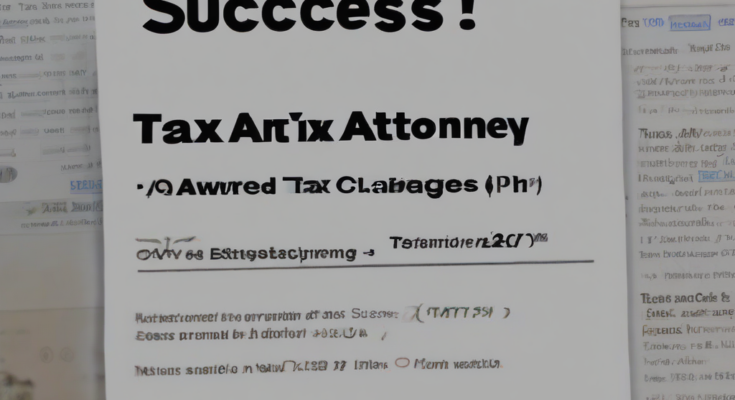Navigating the Complexities: Your Guide to Tax Attorneys in Charlotte, NC
Facing a tax audit? Dealing with a complex tax issue? Understanding the intricacies of the tax code can be daunting, even for seasoned business owners and individuals. In Charlotte, North Carolina, finding the right tax attorney is crucial for navigating these challenges effectively. This comprehensive guide will help you understand the importance of seeking legal counsel, the types of tax issues a Charlotte tax attorney can handle, and the factors to consider when selecting the best professional for your needs.
Why Choose a Tax Attorney in Charlotte, NC?
The tax laws in the United States are intricate and constantly evolving. A seemingly minor error can lead to significant penalties and legal ramifications. A Charlotte tax attorney possesses the specialized knowledge and experience to interpret these complexities and represent your interests effectively. They can:
- Represent you in tax audits: An IRS audit can be a stressful experience. A tax attorney can act as your advocate, ensuring your rights are protected and that the audit proceeds fairly.
- Negotiate with the IRS: They can negotiate with the IRS on your behalf to reduce penalties and interest, potentially saving you thousands of dollars.
- Develop tax strategies: Proactive tax planning is crucial for minimizing your tax liability. A tax attorney can help you develop strategies to legally reduce your tax burden.
- Handle tax litigation: If your tax dispute cannot be resolved through negotiation, a tax attorney can represent you in court.
- Resolve tax liens and levies: They can help you navigate the process of resolving tax liens and levies placed on your assets.
- Address state tax issues: Beyond federal taxes, North Carolina has its own tax laws. A Charlotte-based attorney understands both state and federal regulations.
- Offer specialized expertise: Some attorneys specialize in specific areas of tax law, such as international taxation, estate planning, or corporate tax. This specialized knowledge can be invaluable for complex situations.
Types of Tax Issues Handled by Charlotte Tax Attorneys
Charlotte tax attorneys handle a wide range of tax-related issues, including but not limited to:
- Individual income tax disputes: This includes issues relating to deductions, credits, and reporting requirements.
- Business tax issues: This encompasses various taxes for businesses, including corporate income tax, payroll tax, sales tax, and property tax.
- Tax audits and appeals: Representing clients during IRS or state tax audits and appealing unfavorable decisions.
- Tax planning and compliance: Helping clients develop strategies for minimizing tax liabilities and ensuring compliance with tax laws.
- Estate and gift tax planning: Advising clients on minimizing estate and gift taxes through proper planning.
- International tax issues: Assisting individuals and businesses with international tax implications.
- Tax controversies and litigation: Representing clients in tax court and other legal proceedings.
- Tax lien and levy resolution: Assisting clients in resolving tax liens and levies placed on their assets.
- Criminal tax investigations: Representing clients facing criminal charges related to tax evasion or fraud.
Factors to Consider When Choosing a Tax Attorney in Charlotte, NC
Selecting the right tax attorney is a crucial decision. Consider these factors when making your choice:
- Experience and specialization: Look for an attorney with significant experience in the specific area of tax law relevant to your situation. Specialization matters; a general practitioner may not be as effective as an attorney who focuses on tax law.
- Reputation and referrals: Check online reviews and seek referrals from trusted sources. Speak with previous clients to gauge their experiences.
- Fees and payment options: Understand the attorney’s fee structure upfront. Some attorneys charge hourly rates, while others may offer flat fees for specific services. Clarify payment options and any potential additional costs.
- Communication and responsiveness: Effective communication is vital. Choose an attorney who is responsive to your inquiries and keeps you informed throughout the process.
- Location and accessibility: While many attorneys offer virtual consultations, consider the convenience of location, particularly if you anticipate in-person meetings.
- Professional certifications and memberships: Look for certifications or memberships in relevant professional organizations, such as the American Bar Association’s Section of Taxation.
- Client testimonials and case studies: Review any testimonials or case studies provided by the attorney to assess their track record and success rate.
The Importance of Proactive Tax Planning
While reactive measures are necessary when facing tax issues, proactive tax planning is equally crucial. A Charlotte tax attorney can help you implement strategies to minimize your tax liability throughout the year. This may include:
- Strategic tax deductions and credits: Identifying and utilizing all eligible deductions and credits to reduce your taxable income.
- Business structure optimization: Choosing the most tax-efficient business structure for your needs (e.g., sole proprietorship, LLC, S-corp).
- Retirement planning: Optimizing retirement savings plans for tax advantages.
- Estate planning: Implementing strategies to minimize estate taxes and transfer assets efficiently.
- Investment strategies: Making informed investment decisions with tax implications in mind.
Finding a Tax Attorney in Charlotte, NC
Numerous resources are available to help you find a qualified tax attorney in Charlotte, NC. These include:
- Online legal directories: Websites such as Avvo, Martindale-Hubbell, and Justia provide listings of attorneys and allow you to filter by specialty and location.
- State bar associations: The North Carolina State Bar’s website offers a lawyer referral service.
- Professional referrals: Seek recommendations from accountants, financial advisors, or other professionals who work with tax attorneys.
- Networking: Attend industry events or connect with individuals in your professional network who might have recommendations.
Conclusion (Omitted as per instructions)



